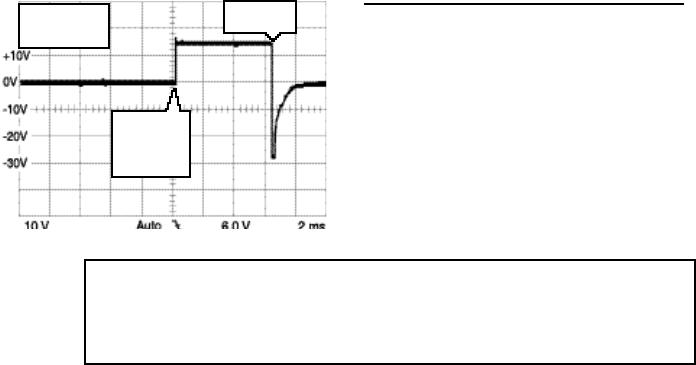
• Reference Waveform
VEHICLE INFORMATIONS
YEAR
:
1990
MAKE : Jeep
MODEL : Cherokee
ENGINE : 4.0 L
FUELSYS : Multiport Fuel Injection
PCM_PIN : 4 Yel wire at #4 injector
STATUS : KOER (Key On Running)
RPM : Idle
ENG_TMP : Operating Temperature
VACUUM
: 16.5 In. Hg
MILEAGE : 85716
NOTE
Some injector spike heights are “chopped” to between -30 V to -60 V by clamping
diodes.
There are usually identified
by the
flat top on their spike(s) instead of
a
sharper point. In those cases, a shorted injector may not reduce the spike height
unless it is severely shorted.
• Troubleshooting Tips
Spikes during on-time or unusual large turn off spikes indicate the injector driver’s malfunction.
6-37
When the Feedback
Fuel
Control System con
t
rols fuel mixture properly,
the injector
on-time will modulate from about 1-6 ms at idle to about 6-35 ms under cold cranking
or Wide Open Throttle (WOT) operation.
The injector coil release spike(s) ranges are from -30 V to -100 V normally.
MAX = 15.9 V
MIN = 27.9 V
DUR = 6.07 ms
PCM turns
injector on
by switching
power on
PCM turns
injector off
PNP Type Injector
• Theory of Operation
A PNP type injector driver within the PCM has two positive legs and one negative leg. PNP drivers pulse power to an
already grounded injector to turn it on. Almost all other injector drivers (NPN type) are opposite. They pulse ground
to an injector that already has voltage applied. This is why the release spike is upside-down. Current flow is in the
opposite direction. PNP type drivers can be found on several MFI systems; Jeep 4.0 L engine families, some pre-
1988 Chrysler engine families, a few Asian vehicles, and some Bosch vehicles in the early 1970s like the Volvo 264
and Mercedes V-8s.
The injector on-time begins where the PCM switches power to the circuit to turn it on. The injector on-time ends
where the PCM opens the control circuit completely.
• Symptoms
Hesitation on throttle tip in, rough idle, intermittent stall at idle, poor fuel mileage, emissions test failure, low power on
acceleration
• Test Procedure
1. Connect the CH A lead to the injector control signal from the PCM and its ground lead to the injector GND.
2. Start the engine and hold thro
t
tle at 2500 RPM
for 2-3 minu
t
es until the engine is
fully warmed
up and the
Feedback Fuel System enters closed loop. (Verify this by reviewing the O
2
sensor signal, if necessary.)
3. Shut off A/C and all other accessories. Put vehicle in park or neutral. Rev the engine slightly and watch for the
corresponding injector on-time increase on acceleration.
1) Induce propane into the intake and drive the mixture rich. If the system is working properly, the injector on-
time will decrease.
2) Create a Vacuum leak and drive the mixture lean. The injector on-time will increase.
3) Raise the engine to 2500 RPM and hold it steady. The injector on-time will modulate from slightly larger to
slightly smaller as the system control the mixture. Generally, the injector on-time only has to change from 0.25
ms to 0.5 ms to drive the system through its normal full rich to full lean range.
IMPORTANT: If the injector on-time is not changing, either the system may be operating in an “open loop” idle
mode or the O
2
sensor may be bad.
4. Use the Glitch Snare mode to check for sudden changes in the injector on-time.
6-36


















